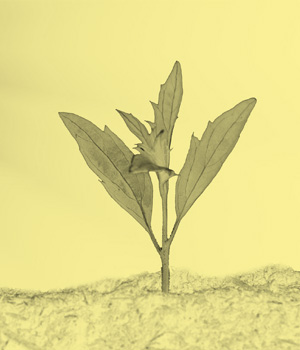When light hits the reset button of a tiny cellular device
An irreversible change in the plant’s lifestyle
When it emerges from the dark and moist soil, the young plant is hit by sunlight for the first time. Follows an irreversible change of lifestyle...
Plants only need soil, light and water to grow. This is what we learn, what we see every day. Leaves have this remarkable ability to capture and use the energy of sunlight to fuel a food-producing factory. But at the beginning of its life, the young seedling grows through the dark soil and cannot yet use light. It relies on nutrients stored in the seed capsule, or in its own tissues, for several days. When it emerges from the soil, the juvenile, naïve leaves of the seedling are hit by light for the first time. What happens next is an extraordinary transformation in each cell of the leaf. Light is being captured, energy flows in the photosynthetic mill, the atmospheric carbon is being fixed and sugars, starch are being made. The seedling becomes self-sufficient. It undergoes the juvenile-to-adult transition.
But what operates this dramatic transformation? How does the plant reprogram its cellular machinery? A tiny, microscopic player in the cell is the key. First identified as a colourable substance in the early XIXth century in all eukaryotes, chromatin is a complex polymer that wraps the genetic material and is encapsulated in the cell nucleus. Chromatin is also the programmable hardware of the cell. Within minutes, hours, the chromatin twists, remodels, reassembles, redistributes instructions on the genes. In doing so, it establishes a new set of instructions for adapting the juvenile leaf to light.
Come and see with us these dramatic changes happening at the microscopic scale that have a big impact on the plant’s life style!
Célia Baroux is a senior researcher at the Institute for Plant and Microbial Biology at the University of Zürich. She investigates microscopic changes in the cell nucleus that underlie cellular responses during the plants’ life. More
Ricardo Randall is a post-doctoral scientist working in the research group of Dr Célia Baroux, and is interested in the molecular control of developmental transitions in plants. More
Related contributions


